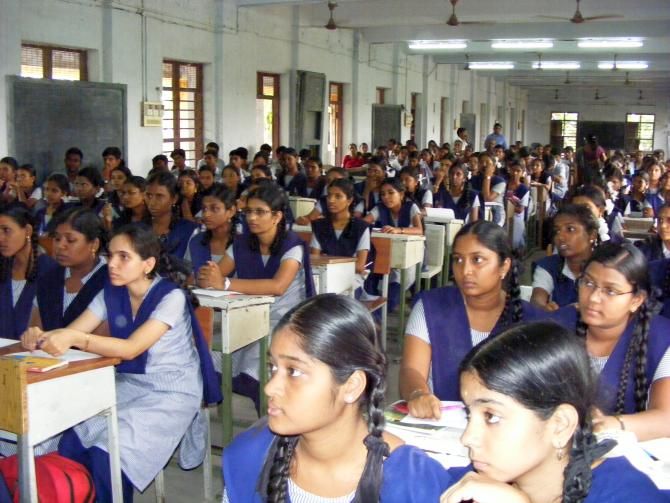 | « Back to article | Print this article |
At no stage is a student encouraged to develop further curiosity in a subject and those who do stumble upon their passion or interest do so more by chance than design.
Anjuli Bhargava examines why educators need to be educated.

The other day the academic head (a foreigner who has been in India for a larger part of his working life) of one of the new private universities in the country told me this: Most Indian schools -- be they government, private or elite schools in the metros -- fail to give their students real education. He said that they manage to make them literate, in some cases even articulate, but they fail to educate them.
On further prodding, he explained that in his view -- and in the view of a cross-section of students that he has met -- the school experience leaves students cold and they want to somehow get it over with.
At no stage is a student encouraged to develop further curiosity in a subject and those who do stumble upon their passion or interest do so more by chance than design.
The British, in his view, had left us with a system that suited them -- designed to train and produce 'peons, clerks, office boys and secretaries' followers (ji hazoor, as he put it) instead of leaders of any kind. That's why the system discouraged original thinking and encouraged blind acceptance of facts, beliefs, values and long-held notions.
The fact that many Indians rose above this was because they were inherently bright and driven; the system did them very little good but it didn't do them any harm either.
Bright kids in, bright kids out.
Further, he argued that even the way the English language was taught was moulding the students into low-level occupations where they used their knowledge of the subject to express their thoughts at a very basic, simple level.
He had students in his university who have scored 94 and 96 on 100 in English but could not put a paragraph together lucidly. He also has a student who had scored 70 on 100 who thought and wrote like a 'dream.'
When he asked the boy why he had performed so badly in the board examination when he was evidently at a higher literary plane in every other way, the boy said that he had made the mistake of writing in his own words.
Following this, I happened to spend three hours one day with the former vice-principal of Delhi Public School, a lady who is now retired after 28 years in service. She says that at the level of Class 11, the schools encourage students to write and compose essays -- and some of them write beautifully -- but the moment the student crosses over into Class 12, they are told to stop all this creative work.
We tell them, "That's great; fantastic work. A plus from me; C plus from the board." Students are asked to never choose questions where there are two sides to the coin (too risky; you will lose marks, they are told). They are repeatedly told to stick to questions that require facts and avoid anything that may have more than one interpretation.
A few years ago, she said, the CBSE board introduced something called HOTS (higher order thinking skills and 20 per cent of the total marks are allotted to this). But she says that a certain predictability has crept into this too and the students (backed by teachers) have found a way to crack this as well -- so whether the students actually have the HOTS is impossible to say.
Finally, two days ago, I met someone -- in connection with another piece I am working on -- who has been educated in India (Shri Ram College of Commerce, Indian Institute of Management-Ahmedabad) who runs a private firm in Gurgaon.
When I spoke of how sad it was -- and such a drain on the country's foreign exchange -- because so many students were leaving India to study overseas, he disagreed completely. He said that despite being at the best institutes, he never felt he got real education.
If as a country, we have to pay this price for our students -- even if a handful -- to get real education, he said it was worth it. It would open their minds and thoughts and expose them to stuff they have never been exposed to through the Indian schooling system.
The three examples I illustrate here are all people who are part of the system, have watched the Indian education space for years and are mostly in agreement with one another. Yet, despite this collective realisation, we are still where we were when the British exited this country.
What does this say for us? I leave you with this thought.
Image published only for representational purposes. Photograph: Kind Courtesy Avanti